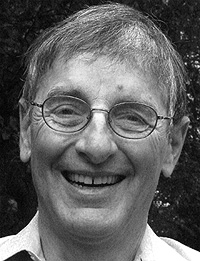Steven Rosen Receives the 2010 Karl Meyer AwardThe Society for Glycobiology is pleased to announce that the recipient of the 2010 Karl Meyer Award is Steven Rosen. The Karl Meyer Award was established in 1990 to honor the distinguished career of Karl Meyer and his outstanding contributions to the field of Glycobiology. This international award is presented to well-established scientists with currently active research programs who have made widely recognized major contributions to the field of Glycobiology.
In 1989, Dr. Rosen collaborated with Larry Lasky in the cloning of the lymphocyte homing receptor, which revealed an amino terminal C-type lectin domain. This receptor (L-selectin) was cloned at the same time as two other selectins (E- and P-), but its impact was especially significant, as it provided compelling evidence that the selectins participate in physiologic cell-cell adhesion. Dr. Rosen went on to show that several mucin-like glycoproteins (e.g., GlyCAM-1, CD34 , and podocalyxin) serve as HEV-expressed ligands for L-selectin. Subsequent work by his group (Yasu Imai) established that the O-linked glycans on GlyCAM-1 and CD34 must be sulfated to interact with L-selectin and they later defined the precise structure of the key determinant as 6-sulfo-sialyl Lewis X (Stefan Hemmerich, Carolyn Bertozzi) . Dr. Rosen with Stefan Hemmerich and Annette Bistrup identified the sulfotransferases that are involved in the synthesis of this ligand and cloned the major one (GlcNAc6ST-2). In parallel with Minoru Fukuda's lab, Dr. Rosen with Kenji Uchimura generated mice deficient in this sulfotransferase and GlcNAcST-1 and demonstrated that the high endothelial venules of these mice lack 6-sulfo-sialyl Lewis X and exhibit markedly reduced ligand activity, providing proof that this sulfated glycan is a component of L-selectin ligands. Taken together, this remarkable body of work established a key role for carbohydrate-lectin interactions in a fundamental process of the immune system. In other work, Dr. Rosen (Megumi Morimoto) identified and cloned two endosulfatases, known as the Sulfs. These novel sulfatases are secreted and remove 6-0-sulfate from glucosamine residues in intact heparan sulfate proteoglycans and in so doing modulate signaling functions carried out by HSPG-binding growth factors. He showed that these sulfatases are over-expressed in a variety of cancers and are able to promote the malignant properties of cancer cells (Roman Nawroth, Hassan Lemjabbar-Alaoui), consistent with them serving as pro-oncogenic proteins. In addition to his scientific contributions, Dr. Rosen has trained a number of graduate students and postdoctoral fellows who have gone on to have very productive careers. He has served as a member of the Board of Directors of the Society for Glycobiology since 2007 and has been a member of the Steering Committee of the NIH Consortium for Functional Glycomics since 2003. For these fundamental accomplishments, Dr. Rosen is recognized as the recipient of the 2010 Karl Meyer Award from the Society for Glycobiology. |

 Dr. Steven D. Rosen (Professor, Department of Anatomy, University of California, San Francisco) is a world leader on studies of the roles of protein-carbohydrate interactions in the immune system and has made seminal contributions to glycobiology in over 30 years of work in the field. A major focus of his lab has been investigation of the binding of lymphocytes in the blood to endothelial cells of high endothelial venules (HEVs) in lymph nodes. This event initiates the migration of lymphocytes into the lymphoid organ, a key step in the process of immune surveillance in the body. In early work done with Lloyd Stoolman, Ted Yednock and Mark Singer, he discovered that the initial adhesive interaction is due to a calcium-dependent, lectin-like receptor on lymphocytes that recognizes sialic acid-containing glycans on HEVs.
Dr. Steven D. Rosen (Professor, Department of Anatomy, University of California, San Francisco) is a world leader on studies of the roles of protein-carbohydrate interactions in the immune system and has made seminal contributions to glycobiology in over 30 years of work in the field. A major focus of his lab has been investigation of the binding of lymphocytes in the blood to endothelial cells of high endothelial venules (HEVs) in lymph nodes. This event initiates the migration of lymphocytes into the lymphoid organ, a key step in the process of immune surveillance in the body. In early work done with Lloyd Stoolman, Ted Yednock and Mark Singer, he discovered that the initial adhesive interaction is due to a calcium-dependent, lectin-like receptor on lymphocytes that recognizes sialic acid-containing glycans on HEVs.